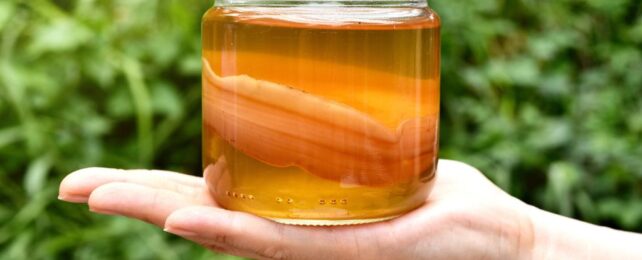People are aware of their gut and the trillions of microbes that call it home like never before. But scientists are still working out how to safely 'seed' our intestines with 'good bacteria' that might improve certain aspects of health.
Kombucha is one of the most popular, low-alcohol beverages in the world, and a big part of its appeal is its potential to provide the gut with probiotics.
A fermented batch of kombucha tea is swimming in yeast and 'health-boosting' gut bacteria, like lactic acid microbes, which studies have tied to improved fat processing in mice.
To date, however, it's unknown whether kombucha can deliver enough microflora to alter the composition of the human microbiome in any significant way.
A new study on roundworms (Caenorhabditis elegans) has found evidence that microbes associated with kombucha tea can "robustly colonize" the animal gut.
Worms that were fed these microbes instead of another diet showed a 'rewired' fat metabolism, say researchers at the University of North Carolina Chapel Hill.
Specifically, these kombucha worms presented a marked reduction in fat stores that was not due to impaired nutrient absorption. Instead, further analysis of the worms' genetic activity suggests the effect stemmed from an increase in fat-busting proteins produced in the worm gut.
Such effects, the researchers argue, mirror the benefits of fasting in humans.
"This investigation lays crucial groundwork to de-convolute the molecular mechanisms that may underlie the purported health benefits of kombucha tea using a genetically tractable animal model," molecular biologist graduate student Rachel DuMez-Kornegay and team concludes.
In recent years, the sale of probiotics, which contain live bacteria, and prebiotic supplements that 'feed' the gut microbiome, have soared as emerging evidence ties certain microbes to improved health outcomes.
But the secrets of the gut are still plentiful. Scientists have only scraped the surface of this emerging field. They still need to figure out how microbes get in the gut, what alters the composition of the microbiome, and how it can be manipulated. While some research suggests probiotics can improve immune health or gastrointestinal disorders, the results so far are mixed.
For kombucha specifically, some small studies have found the drink might benefit the intestinal health of those who eat a Western-style diet. But almost all of the research so far has been done in animal models, and the results can be contradictory.
Not all kombucha is made the same, either. lt comes in many different forms with various compositions of microbial starters. If the drink is not kept at a suitable temperature, these beneficial players could easily die before they are consumed.
To date, very few human clinical trials have tested the impact of kombucha on gut health. In 2023, a pilot clinical study of a dozen participants found kombucha and carbohydrate-rich meals in combination lowered fasting blood glucose levels after four weeks compared to a placebo.
The findings suggest kombucha might have an anti-diabetic effect, but that needs to be confirmed among larger cohorts.
Another more general clinical trial found that eating a diet high in fermented foods, including kombucha, can increase microbiome diversity and decrease markers of inflammation.
As we wait for more clinical trials, animal models like C. elegans will allow scientists to explore the possible mechanisms behind kombucha's purported benefits. Because the genome of worms can be accessed and analyzed easily, these animals are great models to see what gut proteins are upregulated following the consumption of kombucha-associated microbes.
Already, such research has produced unexpected results.
"We were surprised to find that animals consuming a diet consisting of the probiotic microbes found in kombucha tea displayed reduced fat accumulation… " the researchers from Chapel Hill say.
"These findings suggest that the microbes in kombucha tea trigger a 'fasting-like' state in the host even in the presence of sufficient nutrients."
The study was published in PLOS Genetics.
